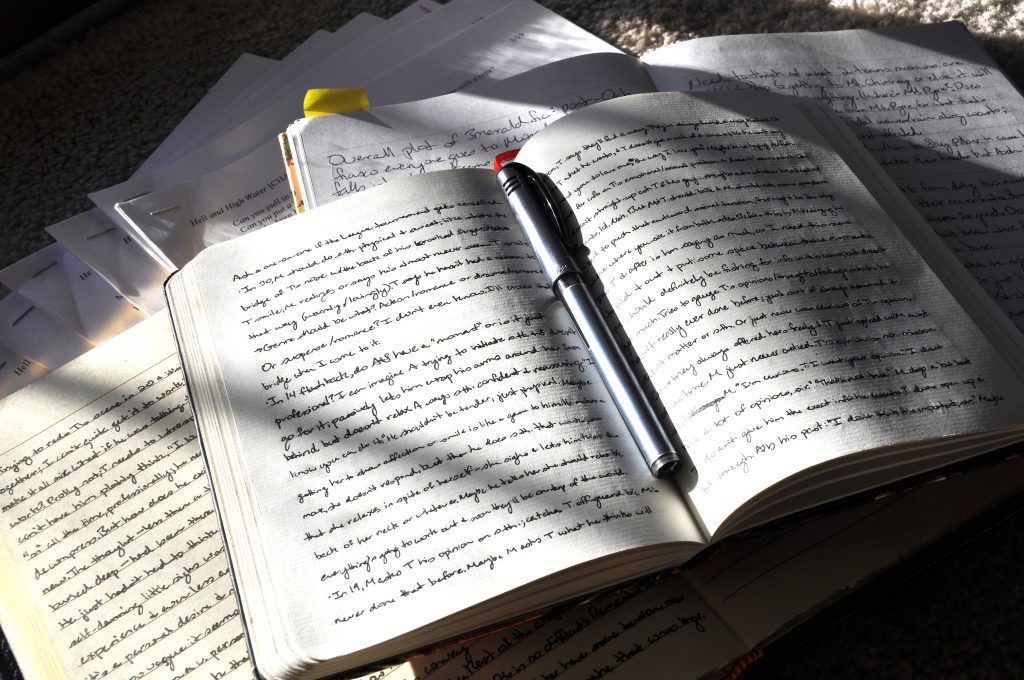
One of the main parts of my inquiry has been over the use of reflection journals. I introduced the journals in the Biology Unit. Over the past four weeks, the students have written seven journal responses. Five of these responses were reflections on the material we had covered in class, while the other two were reflections on their unit projects. For each of the entries, I have given students questions to reflect on and given the students in class time to write. If the students dislike writing, I give them the option of coming after school and having a conversation about the questions with me. Here are a few of my main reflections with regards to journals so far!
The Good:
- The informal assessment on student understanding and confidence is invaluable. I know what students understand well and what they struggle with, so I can adjust my teaching accordingly. One of the entries asked students what in the material did they struggle with. We were learning about non-Mendelian inheritance at the time, and around 75% of the class indicated that they struggled with sex-linked inheritance. Not a single student told me that they were confused during class or even after class. They told me in their journal. After reading their journals, I changed my lesson so we could spend more time on sex-linked inheritance. The students were extremely appreciative for the extra time, their confidence in the topic increased, and their results on their quiz indicate that the vast majority of the class understood the concepts now. Without those journals, I would not have known that they students were struggling unit the quiz.
- The goal of these journals was to help students reflect on their understanding so that they will be more accountable for their learning. One of my initial entries asked students “How is the unit going so far?” to see how students felt with the new material. One student, after writing a full page, summarized his entry with the following quote. Reading this lifted my spirits. Some of the students found these journals useful, something I was worried that they wouldn’t.
“So far this unit has been a new experience for me. I’ve never had a science class that didn’t use a textbook and the reflections are an interesting addition. It gives me an opportunity to review and constantly look over my progress in the class”
The Bad:
- I have more journal responses planned in my unit than I seem capable of completing in class. More often than not, students value the learning activities that we engage in during class, which often doesn’t allow for time for critical reflection. For example, I a few of the journal responses have asked students to reflect on how they feel about the material and how they plan on studying for their upcoming quiz. My goal was to have them write a journal after the quiz to reflect on the process of studied, how they felt going into the quiz and leaving, as well as what they would do next time. This journal did not happen due to time constraints.
- The level of feedback I receive varies from student to student. Some journal entries are so thorough and allows me to know exactly where the student is at. These often come from students who do not need the extra help though. I’ve found that many students put in the bare minimum and answer the questions, but it is evident that reflection is not present. I feel like it is a waste of their time, as well as my time to read them, when they don’t help anyone.
- The process of reading journals is extremely tedious. I collect at least 50 journals, then read them and then write comments. I want to use these as another form of communication, especially with students who are quieter, as I feel like we often have some really great dialogue. Yet reading and writing can take a few hours, which is valuable time. I’ve found myself writing less comments and skimming more, to get a general feeling of where the class is at. I hope that I can make more time to write comments again.
The future of journals?
In my upcoming chemistry unit, I will continue with the journals but make a few changes:
- Some days, I hope that students will come to class with their journals and will share their responses with a partner instead of me reading 50+ entries! I hope that this can foster social-emotion learning and build stronger relationships between students as students will be sharing their learning experiences and opening up about how they need help. I hope that students can hear each other’s struggles and will be able to work together to enhance each other’s understandings.
- I will be giving students more flexibility when it comes to what they can write about. In all of our entries so far, I have provided students with fixed questions that needed to be answered. This allowed me to receive the feedback that I found to be most useful. It does mean though that students can write a total of 15 words and have their journal be “complete.” My goal is to guide students in their entries, but on journals that I collect and read, I will give them completion marks based on depth of reflection. I hope that this will encourage all students to critically reflect, and will encourage those who do the bare minimum to meet a higher minimum.
- Have a minimum of 2 journal entries a week, one due Wednesday and one due Friday. My hope is that I can see where students are midweek to plan for the rest of the week, and on Friday’s to see how I can plan the upcoming week.
- Encourage students to reflect on the process of studying, writing quizzes/tests, and receiving their marks. I want to see how students feel going into tests and coming out of them, and if there is any growth in their metacognition.
I have really enjoyed these journals and I look forward to incorporating them into my own classrooms in the future!
